【精校版】人教版(八年级下册)英语导学案:Unit 3(第4课时) Section B (2a-selfcheck)
- 格式:doc
- 大小:49.00 KB
- 文档页数:3
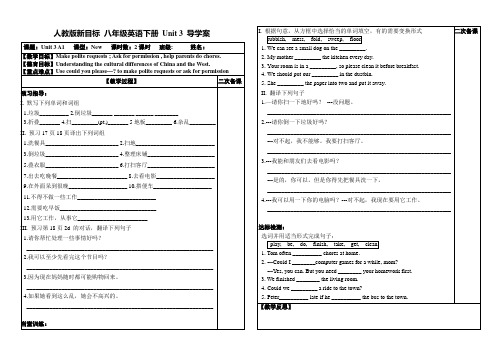
人教版新目标八年级英语下册Unit 3 导学案课题:Unit 3 A1 课型:New 课时数:2课时班级: 姓名:【教学目标】Make polite requests ; Ask for permission , help parents do chores.【德育目标】Understanding the cultural differences of China and the West.【重点难点】Use could you please---? to make polite requests or ask for permission【教学过程】二次备课预习指导:I. 默写下列单词和词组1.垃圾__________2.倒垃圾_______ _______ ______ ________3.折叠_______4.扫_________(pt.)_______ 5地板_________ 6.杂乱_________II. 预习17页18页译出下列词组1.洗餐具_________________________2.扫地___________________________3.倒垃圾_________________________4.整理床铺_______________________5.叠衣服_________________________6.打扫客厅_______________________7.出去吃晚餐________________________ 8.去看电影____________________9.在外面呆到很晚____________________ 10.搭便车____________________11.不得不做一些工作___________________________12.需要吃早饭_________________________________13.用它工作,从事它________________________III. 预习第18页2d 的对话,翻译下列句子1.请你帮忙处理一些事情好吗?________________________________________________________________2.我可以至少先看完这个节目吗?________________________________________________________________3.因为现在妈妈随时都可能购物回来。
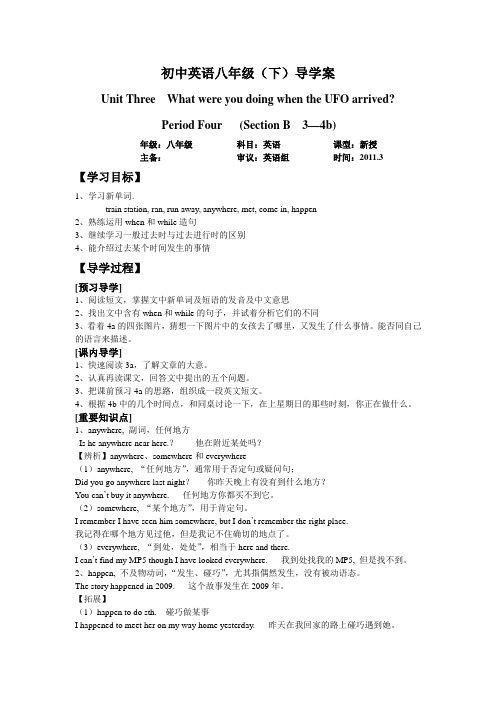
初中英语八年级(下)导学案Unit Three What were you doing when the UFO arrived?Period Four (Section B 3—4b)年级:八年级科目:英语课型:新授主备:审议:英语组时间:2011.3【学习目标】1、学习新单词.train station, ran, run away, anywhere, met, come in, happen2、熟练运用when和while造句3、继续学习一般过去时与过去进行时的区别4、能介绍过去某个时间发生的事情【导学过程】[预习导学]1、阅读短文,掌握文中新单词及短语的发音及中文意思2、找出文中含有when和while的句子,并试着分析它们的不同3、看着4a的四张图片,猜想一下图片中的女孩去了哪里,又发生了什么事情。
能否同自己的语言来描述。
[课内导学]1、快速阅读3a,了解文章的大意。
2、认真再读课文,回答文中提出的五个问题。
3、把课前预习4a的思路,组织成一段英文短文。
4、根据4b中的几个时间点,和同桌讨论一下,在上星期日的那些时刻,你正在做什么。
[重要知识点]1、anywhere, 副词,任何地方Is he anywhere near here.?他在附近某处吗?【辨析】anywhere、somewhere和everywhere(1)anywhere, “任何地方”,通常用于否定句或疑问句;Did you go anywhere last night?你昨天晚上有没有到什么地方?You can’t buy it anywhere. 任何地方你都买不到它。
(2)somewhere, “某个地方”,用于肯定句。
I remember I have seen him somewhere, but I don’t remember the right place.我记得在哪个地方见过他,但是我记不住确切的地点了。
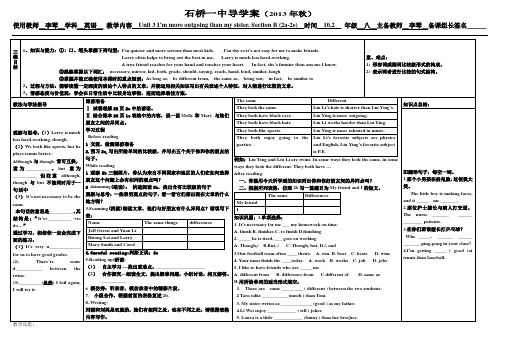
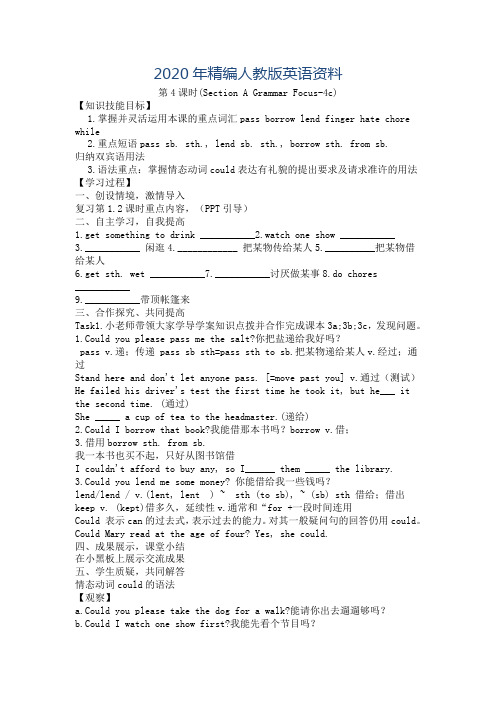
2020年精编人教版英语资料第4课时(Section A Grammar Focus-4c)【知识技能目标】1.掌握并灵活运用本课的重点词汇pass borrow lend finger hate chore while2.重点短语pass sb. sth., lend sb. sth., borrow sth. from sb.归纳双宾语用法3.语法重点:掌握情态动词could表达有礼貌的提出要求及请求准许的用法【学习过程】一、创设情境,激情导入复习第1.2课时重点内容,(PPT引导)二、自主学习,自我提高1.get something to drink ___________2.watch one show ___________3.___________ 闲逛4.____________ 把某物传给某人5.__________把某物借给某人6.get sth. wet ___________7.___________讨厌做某事8.do chores___________9.___________带顶帐篷来三、合作探究、共同提高Task1.小老师带领大家学导学案知识点拨并合作完成课本3a;3b;3c,发现问题。
1.Could you please pass me the salt?你把盐递给我好吗?pass v.递;传递 pass sb sth=pass sth to sb.把某物递给某人v.经过;通过Stand here and don't let anyone pass. [=move past you] v.通过(测试)He failed his driver's test the first time he took it, but he___ it the second time. (通过)She _____ a cup of tea to the headmaster.(递给)2.Could I borrow that book?我能借那本书吗?borrow v.借;3.借用borrow sth. from sb.我一本书也买不起,只好从图书馆借I couldn't afford to buy any, so I______ them _____ the library.3.Could you lend me some money? 你能借给我一些钱吗?lend/lend / v.(lent, lent ) ~ sth (to sb), ~ (sb) sth 借给;借出keep v. (kept)借多久,延续性v.通常和“for +一段时间连用Could 表示can的过去式,表示过去的能力。
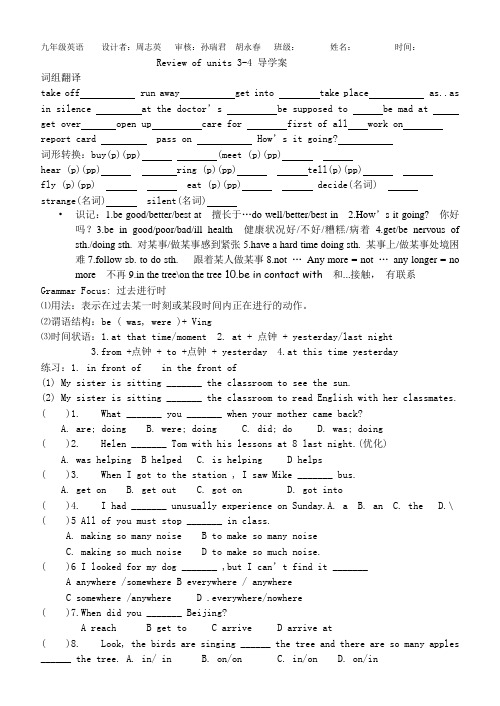
Review of units 3-4 导学案词组翻译take off run away get into take place as..as in silence at the doctor’s be supposed to be mad at get over open up care for first of all work onreport card pass on How’s it going?词形转换:buy(p)(pp) (meet (p)(pp)hear (p)(pp) ring (p)(pp) tell(p)(pp)fly (p)(pp) eat (p)(pp) decide(名词)strange(名词) silent(名词)•识记:1.be good/better/best at 擅长于…do well/better/best in 2.How’s it going? 你好吗?3.be in good/poor/bad/ill health 健康状况好/不好/糟糕/病着 4.get/be nervous ofsth./doing sth. 对某事/做某事感到紧张5.have a hard time doing sth. 某事上/做某事处境困难7.follow sb. to do sth. 跟着某人做某事8.not …Any more = not …any longer = nomore 不再9.in the tree\on the tree10.be in contact with 和...接触,有联系Grammar Focus: 过去进行时⑴用法:表示在过去某一时刻或某段时间内正在进行的动作。
⑵谓语结构:be ( was, were )+ Ving⑶时间状语:1.at that time/moment 2. at + 点钟 + yesterday/last night3.from +点钟 + to +点钟 + yesterday4.at this time yesterday练习:1. in front of in the front of(1) My sister is sitting _______ the classroom to see the sun.(2) My sister is sitting _______ the classroom to read English with her classmates.( )1. What _______ you _______ when your mother came back?A. are; doingB. were; doingC. did; doD. was; doing( )2. Helen _______ Tom with his lessons at 8 last night.(优化)A. was helping B helped C. is helping D helps( )3. When I got to the station , I saw Mike _______ bus.A. get onB. get outC. got onD. got into( )4. I had _______ unusually experience on Sunday.A. a B. an C. the D.\( )5 All of you must stop _______ in class.A. making so many noise B to make so many noiseC. making so much noise D to make so much noise.( )6 I looked for my dog _______ ,but I can’t find it _______A anywhere /somewhereB everywhere / anywhereC somewhere /anywhereD .everywhere/nowhere( )7.When did you _______ Beijing?A reachB get toC arriveD arrive at( )8. Look, the birds are singing ______ the tree and there are so many apples ______ the tree. A. in/ in B. on/on C. in/on D. on/in( )10. The teacher told us the moon ________ around the earth.A. wentB. goesC. goingD. move( )11. DO you think _________ an English film tomorrow night?A. is thereB. there is going to beC. there is going to haveD. will there be ( )12. I don’t know if she __________ tomorrow.If she _________ tomorrow, I’ll call you.A. comes; comesB. comes; will comeC. will come; comesD. will come; is coming ( )13.The piane will_________ from Beijing capital airport and land in London.A.take onB.take offC.take outD.take away用所给单词的适当形式填空。
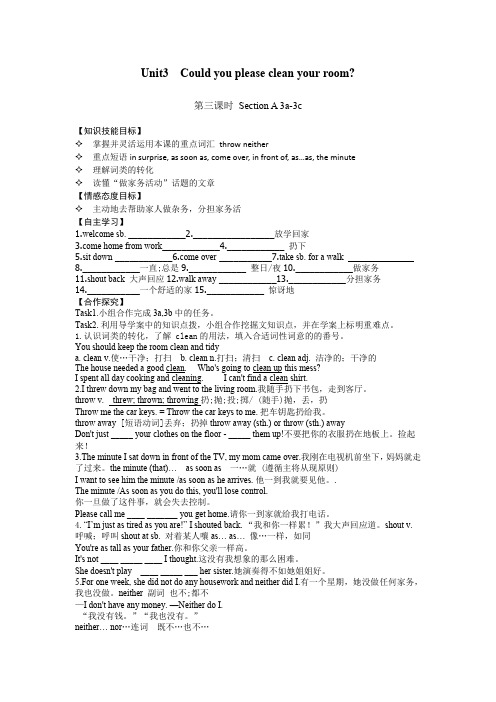
Unit3 Could you please clean your room?第三课时Section A 3a-3c【知识技能目标】✧掌握并灵活运用本课的重点词汇throw neither✧重点短语in surprise, as soon as, come over, in front of, as…as, the minute✧理解词类的转化✧读懂“做家务活动”话题的文章【情感态度目标】✧主动地去帮助家人做杂务,分担家务活【自主学习】1.welcome sb. ____________2._________________放学回家e home from work____________4.____________ 扔下5.sit down ____________e over ___________7.take sb. for a walk8.____________一直;总是9.____________ 整日/夜10.____________做家务11.shout back大声回应12.walk away ____________13.____________分担家务14.___________一个舒适的家15.____________惊讶地【合作探究】Task1.小组合作完成3a,3b中的任务。
Task2.利用导学案中的知识点拨,小组合作挖掘文知识点,并在学案上标明重难点。
1.认识词类的转化,了解 clean的用法,填入合适词性词意的的番号。
You should keep the room clean and tidya. clean v.使…干净;打扫b. clean n.打扫;清扫c. clean adj. 洁净的;干净的The house needed a good clean. Who's going to clean up this mess?I spent all day cooking and cleaning. I can't find a clean shirt.2.I threw down my bag and went to the living room.我随手扔下书包,走到客厅。
Unit 3 Could you please clean your roomThe First Period ( Section A 1a-2d )教师寄语: Only do what your heart tells you.随心而行。
2.自学内容1)依据音标自学本课时的新单词和短语,特别注意单词的词性和词义:单词词性词义单词词性词义rubbish floorfold messsweep【讲堂活动】1.预习展现4)打扫地板I.翻译以下短语5)铺床1)洗盘子6)打扫客堂2)倒垃圾7)搭便车3)叠衣服8)去看电影II.翻译以下句子1)请你打扫房间好吗clean your room2)我能用一下你的电脑吗your computer3、合作研究怎样用英语表达有礼貌的恳求【察看】 Could you please give me a handWould you mind me opening the windowMay I use your pen【训练反应】I. 单项选择1.Your room is in mess now. Why not clean it up every morningA. aB. anC. theD. /2.Two days too long. You only have the time of a day.A. hasB. lastC. areD. is3.--Could you clean the living room--.A. Yes, I couldB. Yes, sureC. No, I don’Dt. Sorry, I couldn’ t.4. We’ ll have a party for Jack if he this project on time.A. finishesB. will finishC. finishedD. would finish5. He eats much that he can’ t walk a long way.A. tooB. suchC. soD. veryII.用括号内所给单词的适合形式填空1.Li Lei always takes out the(rubbish).2.Could you(sweep) the floor3.Could you please(buy) me a map of China4.Can you finish(read) this novel tomorrow afternoon5.He had to do the(dish) at home because of this mother’ s illness. III.选词填空fold, floor, mess, out, late1.Mr. Smith lives on the fifteenth, and he always takes the lift up and down.2.You need to take the rubbish outside every day.3.The heavy rain made a great of the garden.4.His father often stays out_ , and his parents sometimes quarrel with each other about it.5.My brothers are very lazy. They seldom their quilts in the morning.Unit 3 Could you please clean your roomThe Second Period ( Section A 3a-3c )教师寄语: A liar is not believed when he speaks the truth.谎话者即便讲实话也没人相信。
英语导学案(八下Units3-4)一、重要的词汇While experience imagine follow amazing shout anywhere happen accident close silence meaning hero suppose true lucky copy area thin decision influence return danger二、重要的短语1.出去,离开2.起飞3.逃跑4.听说5.发生6.像……一样7.传递8.克服9.打开10.照料三、要点解析1 (when / while):1. I was shopping ______ it rained heavily.2、______ she was reading, the telephone rang.when与while都有“当……时候”的意思,都可引导时间状语从句,但while引导的时间状语从句常使用过去进行时,而when引导的时间状语从句通常用一般过去时。
2、Everyone knows how important the job is! ___________“How +形容词+主语+谓语!”是感叹句的句型之一,该感叹句作宾语从句时,语序不变。
如文中的句子:You can imagine how strange it was![拓展延伸] “What (+a / an)+形容词+名词+主语+谓语!”和“How+副词+主语+谓语!”也是感叹句的常用句型。
如:What a good boy he is! 又如:How hard they are working!3 take off(1)飞机起飞的时候天正下着大雨。
It___________ ___________heavily when the plane______________________.(2) 在日本当你去拜访朋友时,进门之前要脱掉鞋子。
Unit3 SectionA〔3a-4c〕导学案Unit3 Section A〔3a-4c〕课前预习学习目标1.1.1 Language targets语言目标1.1.1.1 Key Words and Chunks1.1.1.1.1 For applying: throw,neither,shirt,pass,borrow,lend,finger,hate,chore,while,all the time, as soon as, the minute, take the dog for a walk, help out, come home from work, in surprise, get something to drink, hang out, get it wet, finish reading, share the housework1.1.1.1.2 For comprehending: reply, angry, comfortable1.1.1.2 Sentence Structures1) I threw down my bag and I went to the living room.2) The minute I sat down in front of the TV, my mom came over.3) Could you please take the dog for a walk?4) I’m just as tired as you are!5) For one week, she did not do any housework and neither did I.6) The next day, my mom came home from work to find the house clean and tidy.7) “What happened?’’ she asked in surprise.8) Could we get something to drink after the movie?9) Could I hang out with my friend after the movie?10) My mom came over as soon as I sat down in front of the TV.11) I’ll finish my homework while you help me with the dishes.1.1.1.3 Grammar Focus1〕 Could you please take the dog for a walk?/ Could I hang out with my friend after the movie?〔情态动词could用于有礼貌地向对方提出请求或请求对方的许可,用于疑问句中,可代替can,比can更委婉、更有礼貌。
人教版精品英语资料(精校版)Unit 3 could you please clean your room?第四课时Section B (2a-selfcheck)【Free talk】Discuss whether kids should help out with chores at home.【学习目标】1. 能掌握下列单词和短语:stress, waste, provide, develop, fairness, since, result, independence,independent, a waste of, spend…on, in order to, get good grades, mind doing sth., depend on, look after, take care of, as a result2. 重点掌握以下句型:(1) They do not have time to study and do housework.(2) They should spend their time on schoolwork in order to get good grades and get into agood university.(3) There is no need for them to do it now.(4) I do not mind doing them.(5) Children these days depend on their parents too much.(6) The earlier kids learn to be independent, the better it is for their future.3. 情态动词need 的用法。
【导学案】一、阅读课本第22页-第24页,独立翻译下面的短语:1. 浪费_____________2. 花费时间或金钱做…______________3. 目的是,为了______________4. 取得好成绩_______________5. 介意做某事______________6. 依靠,依赖_______________7. 照顾,照料______________二、开动脑筋,翻译下列句子吧。
1. They should spend their time on schoolwork in order to get good grades and get into a good university. __________________________________________________________________2. 家务活就是在浪费时间。
_________________________________________________3. Children these days depend on their parents too much._________________________________________________4. 孩子们越早的学会独立,对他们的未来就越好。
_________________________________________________5. 我不介意做家务。
_________________________________________________6. Doing chores helps to develop children’s independence and teaches them how to look after themselves. _______________________________________________________________【课中案】一、自主学习:1. 学生自读2b, 记忆文中的重点语句。
2. 小组互相检查2b的读、重点语句的听写.3. 小组共同完成2c, 2d and 2e.4. Do a survey: Discuss whether kids should help out with chores at home.5. 写作训练:小组共同完成3a and 3b.(根据小调查得出的结论完成写作练习)二、仔细自读课文,做出正误判断。
(T 或F)1. Mr. Smith thinks there no need for children to do chores. ( )2. Ms. Miller doesn’t mind doing chores. ( )3. These days kids are dependent. ( )4. In Ms. Miller’s opinion, it’s enough to get good grades. ( )1. I do not mind doing them.(1) mind作可数名词,意为"脑子;想法;记性"。
如:An idea has just come into my mind. 我刚才想到一个主意。
(2) mind作动词。
意为"当心;注意",后跟名词或从句,也可单独使用。
如:Mind the step! 小心台阶!(3) 意为"介意;在乎",-Do you mind if I smoke? -Not at all, please.-Would you mind me opening that door? -I'm sorry, but it\'s not allowed.2. Children these days depend on their parents too much.depend on的意思是: 依赖,依靠; 取决于,随…而定.如:Your dreams depend on it. 你的成败取决于此。
You can depend on him to make a sound choice. 你可以依靠他作出正确的选择。
3. need的用法作情态动词⑴need作情态动词无人称或数的变化,后接动词原形,多用于否定句和疑问句中。
例如:You needn't worry.你不必担心。
⑵由need引出的一般疑问句,肯定回答常用must或have to; 否定答语常用needn't. 例如:—Need I answer the question? 我需要回答那个问题吗?—Yes, you must. /Yes, you have to. 是的,你必须回答。
/是的,你得回答。
/No, you needn't.不,不必了。
⑶由must引出的一般疑问句,肯定回答用must, 否定答语用needn't或don't have to。
例如:—Must I do the work now? 我必须现在干这个活吗?—Yes, you must /have to.是的,你必须做。
/No, you needn't /don't have to. 不,你现在不必做。
作行为动词need 作为行为动词有人称和数的变化,后面可接名词、代词、动名词及带to 的动词不定式;有肯定句、疑问句和否定句的变化,例如:She needs help.她需要帮助。
I don't need to see the doctor.我不需要看病。
—Do you need to go at once? 你需要马上走吗?—Yes, I do.是的,我得马上去。
/No, I don't.不,不用马上走。
精题演练:根据句意及首字母补全单词,使句意完整1. We have to s______ the hallways every day. It’s really boring.2. I often do the d_______ after dinners. My parents are very pleased with me.3. Could you please take c______ of my baby I have something important to do and I must go now.4. Please t________ out your exercise book. We are going to do some exercises.5. Miss Gao asked you to go to a m________. It is starting in 3 minutes.6. May I b________ your dictionary? I have lent mine to my sister.7. I have to do c_______ of cleaning, shopping, washing every day.8. Does Jim m_________ the bed very often? No, he doesn’t.9. Peter. Don’t f_________ to buy your clothes like that.10. The old like f____________ pets, because pets are just like their kids.【课后案】一、根据汉语提示完成下列句子。
1.Could you please______________ __________(拿出去)the dirty shoes?2.We ________ __________ _________(邀请一名老外)to our party.3.I don’t enjoy_________ __________ _________(洗餐具).4.She often__________(向我借钱) money _________ me.5.Teachers should ________ _________ _________(关心爱护)their students6.His father is _________ __________(从事) an important job二、句型转换。
1. She washes her hair every day.(改为一般疑问句)_________ she _________her hair every day?2. We invited Mr. Li to the meeting.(改为否定句)We_________ _________ Mr. Li to the meeting.3. He walks his dog every day.(对划线部分提问)_________ __________ __________ he __________ his dog?4. They exercise two hours a week(对划线部分提问).___________ ___________ _________ do they exercise a week?5.Can you take care of my baby?(改写同义句)Can you__________ _________ my baby?6.You can lend your bike to my daughter. (改为委婉语气)_________ _________please lend your bike to my daughter..三、完形填空。